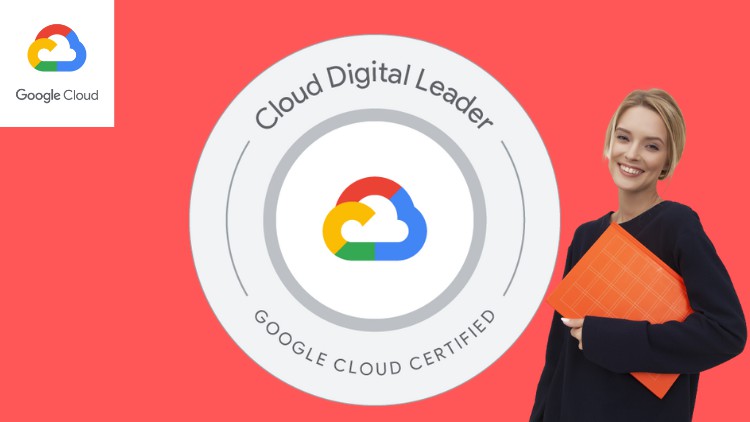
3 UPDATED practice tests for Digital Leader exam. Pass Digital Leader exam in first attempt.
What you will learn
Understand exam questions related to setting up a cloud solution environment.
Learn the fundamentals of Google Cloud.
Understand exam questions related to planning and configuring a cloud solution.
Understand the exam questions on Deploying and Implementing Cloud Solutions.
Understand the exam questions related to achieving stable operation of a cloud solution.
Description
The Cloud Digital Leader is a certification for beginning professionals that refers to individuals who not only understand the various features of Google Cloud’s core products and services, but also can determine how to use them to achieve desired business goals.
The exam is 90 minutes long with 50 questions. The exam can be taken either at a test center (on-site) or online (remotely monitored).
Section 1: Overview of Digital Transformation with Google Cloud (approx. 10% of exam content)
1.1 Explain why cloud technology is revolutionizing business
a. Define key terms such as cloud, cloud technology, data, and digital transformation
1.2 Explain why it is critical for businesses to adopt new technologies
a. Compare and contrast cloud technologies with traditional (on-premise) technologies
b. Explain how cloud technology has changed customer expectations
c. Identify business and technical considerations for your organization’s adoption of cloud technologies (e.g., infrastructure, application and business platform modernization, data criticality, security in the cloud)
Section 2: Data and Innovation with Google Cloud (approximately 30% of the exam content)
2.1 Explain the role of data in digital transformation and the importance of a data-driven culture
a. Explain how cloud technologies can enable new ways of applying data
2.2 Identify commonly used Google Cloud solutions for data management
a. Give examples of structured and unstructured data
2.3 Identify Google Cloud solutions commonly used for smart analytics
a. Describe the business benefits of storing data in the cloud.
b. Apply appropriate use cases for databases, data warehouses, and data lakes
c. Describe the benefits of Google Cloud data products (Looker, BigQuery, Cloud Spanner, Cloud SQL, Cloud Storage)
2.4. Identify Google Cloud solutions for machine learning and AI
a. Define artificial intelligence (AI) and machine learning (ML)
b. Explain the importance of data quality in the predictive accuracy of ML
c. Describe Google Cloud differentiators for AI and machine learning
d. Identify how to leverage Google Cloud AI and ML solutions to create business value
Section 3: Infrastructure and Application Modernization (approximately 30% of the exam)
3.1 Identify the implications of modernizing IT infrastructure with Google Cloud
a. Explain why it is difficult to deliver modern services to customers with legacy infrastructure
b. Explain the benefits of modernizing infrastructure with cloud technologies
c. Differentiate between hybrid and multi-cloud infrastructure
d. Differentiate between virtual machines, containers, and serverless computing within a business use case
e. Identify Google Cloud solutions to help enterprises modernize their infrastructure
3.2 Learn about application modernization with Google Cloud
a. Describe the business drivers for modernizing applications
b. Describe the benefits of using cloud native applications
c. Apply appropriate change patterns to a variety of business use cases
d. Describe the benefits of Google Kubernetes Engine, Anthos, and App Engine for application development
3.3 Explain the value of APIs
a. Explain how application programming interfaces (APIs) can modernize legacy systems
b. Explain how APIs bring new business value
c. Describe the benefits of Apigee
Section 4: Understanding Google Cloud Security and Operations (30% of exam content)
4.1 Describe financial governance in the cloud and Google Cloud recommended best practices for effective cloud cost management
a. Explain how the adoption of cloud technologies impacts total cost of ownership (TCO)
b. Identify cost management strategies required for specific business scenarios
4.2 Describe cloud security approaches and the security benefits of Google Cloud
a. Define basic terms related to cloud security (e.g., privacy, availability, security, control)
b. Explain the significance of the shared responsibility model
c. Describe the security benefits of using Google Cloud
d. Identify today’s key cybersecurity challenges and threats to data privacy
e. Describe how organizations control and manage access to cloud resources
4.3 Explain how IT operations need to adapt for successful cloud operations/
a. Explain the differences in service availability requirements between cloud and on-premise environments
b. Describe operational challenges that can be solved with DevOps
c. Apply Site Reliability Engineering (SRE) goals to various business use cases
4.4 Identify Google Cloud solutions for cloud resource monitoring and application performance management
a. Describe the impact of unexpected and extended downtime
b. Define monitoring, logging, and observability for cloud operations
c. Identify Google Cloud resource monitoring and maintenance tools
